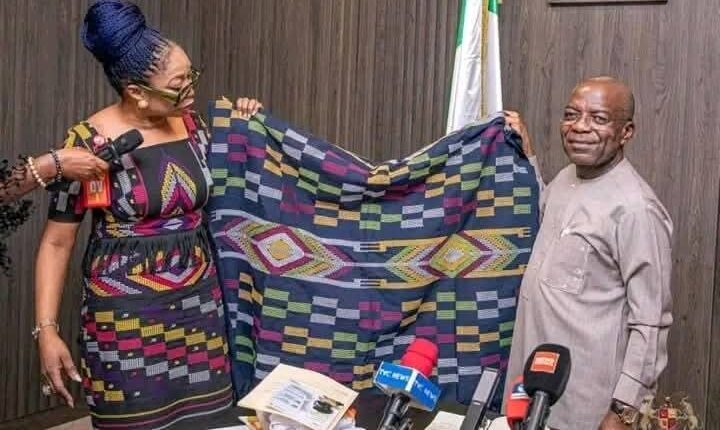By Moses Idika
Last week Friday, the Governor of Abia State, Dr. Alex Otti received in audience a group of future-driven changemakers led by Mrs. Irunna Ejibe, the Founder and Chief Executive Officer of Ethnocentrique Limited, a company that promotes creativity amongst young talents in Nigeria in several areas including fashion.
In his welcome speech to his guests, Governor Otti noted that the company’s interest in the traditional Akwete fabric was in alignment with his government’s policy of growing local products as a way of stimulating a home-grown economic response to the needs of the people in the areas of industrialisation, forex generations and employment creation for the teeming young people in the state.
The Governor noted that for Akwete to become more economically viable, there is an urgent need to modernise its production and scale up its marketing to the outside world.
According Otti, “The Akwaete market looks like an oligopolistic market just like you said; where daughters – mothers and grandmothers handles the business. It doesn’t go beyond that, we need to find a way to expand it.
“While not deriding what they have done, we can always improve by applying technology, maybe cost of production may become cheaper by the time you have large scale production.
“We can also pass a legislation that ensures that people use it and it must be available for people to get it”
The move of the Abia State governor is indeed gratifying and could be a major shift in everything “Igbo.”
That is, if Governor Alex Otti can walk the talk!
Akwete is not just a fabric, but an iconic cultural monument that exemplifies the ingenuity and creativity of the Igbo race. It is an art, a symbol and classic identity of the finesse of the Igbo people of Nigeria. The European did not meet the Igbo naked after all!
In the fashion world, Africa is credited and recognised for the origins of certain iconic fabrics including, Akwete, (Igbo, Nigeria), Ukara (Igbo, Nigeria) Aso Oke, (Yoruba, Nigeria) Adire, (Mali/Nigeria), Chitenge, (Zimbabwe), Kente, (Ashanti/Ewe, Ghana), Barkcloth, Shweshwe, (Lesotho) Mud cloth/ Bògòlanfini (Bambara, Mali), Shweshwe (Lesotho), Kanga (Tanzania), Kiteng (Tanzania), Kikoy (Massai, Kenya) and Isi Agu (Igbo, Nigeria).
However, despite the authenticity of Akwete as among the most rooted in the culture of its people, it is the least popular amongst modern African and global fabric and fashion curators.
Akwaete which is indigenous to the Ndoki people of Ukwa in Abia State has been the pride of Igbo people, but successive Igbo art and fashion promoters, curators, historians and anthropologists, and governments seem to have conveniently ignored and at best treated Akwaete as an artifact!
In similar manner, most people may not even be aware that Ukara or Ukara Ekpe is indigenous to Abakaliki, the capital city of present day Ebonyi State. Ukara is today celebrated in Cross River State and Cameroon, but the Igbo people who own the technology seem to have abandoned it. For emphasis, Ukara is designed with Nsibidi ideographic characters , perhaps the only known orthographic system in Africa that dates back to the 5th Century, hundreds of years before the Europeans “discovered” it in 1904.
It is now most imperative, therefore, that Igbo people through the governments of its five states should restart the Igbo renaissance that can look at a holistic rebound of its people, economy and culture.
For what is what, no economy has ever developed outside its culture. Lost cultures are lost people and until the Igbo people rediscover themselves, through their culture, it may be eternally a herculean task to rise on the back of borrowed cultures.
Every science, every technology, every development is rooted, strongly in the culture of those who advance them. The Igbo people, just like other colonized Africans have continually struggled and labelled the “third world” since their cultures were insidiously taken away from them.
It is on this background, therefore, that it is a thing of joy that Governor Alex Otti stands a chance to further etch his name in the annals of Igbo renaissance if he can walk the talk and revive Akwete, first as a viable indigenous product that can earn income for its producers and at the same time as a cultural ambassador of a hardworking people who had their science, their technology and their culture long before Europe tried to rewrite history.
We are not unmindful of the showcase of Akwete fabric designs by the Executive Governor of Anambra State, Professor Chukwuma Soludo, but then we have to up the ante.



